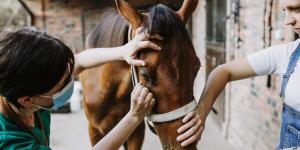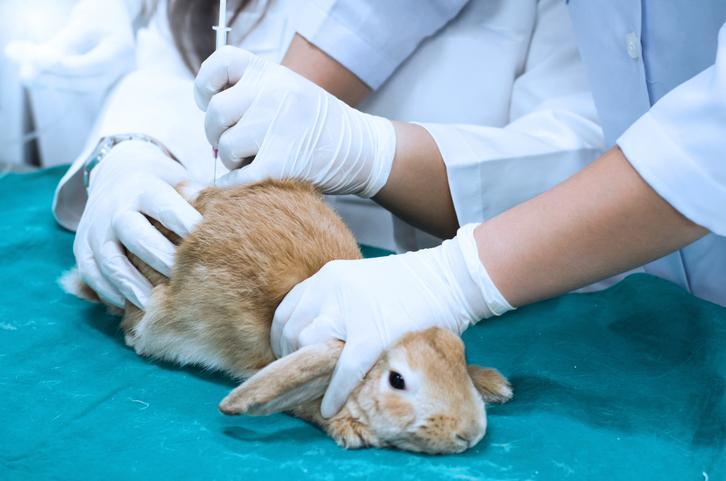Rabbit Rabies Symptoms and Treatment



See files for Rabbits
Rabies in rabbits is a deadly disease which is made all the more terrifying by being zoonotic. This means it is a disease which can spread between different species. While we may associate rabies with other mammals such as dogs, bats or wolves, it is possible for a rabbit to become infected by rabies. While there is treatment available for rabies, once the infection has spread sufficiently in the body, it will be fatal. During the latter stages of infection, the animal infected with rabies will become indiscriminately aggressive, increasing the risk of possible transmission.
At AnimalWised, we find out more about rabbit rabies symptoms and treatment. We also discover what prevention methods are available.
Can rabbits get rabies?
Rabies is a viral disease that can affect the central nervous system of any warm-blooded animal. It is most commonly associated with larger mammals such as dogs, foxes or raccoons, but is also known to affect smaller mammals such as bats.
It is possible for a rabbit to be infected by rabies. Fortunately, the incidence of rabies in small rodents and mammals such as lagomorphs is relatively rare[1]. While rabbits can get rabies, they are not known to be a natural reservoir for the disease. In fact, they have never been implicated as the cause of human infection of rabies in the United States. Data for other countries is not readily available, but the risk to humans is considered low.
If a rabbit is infected by rabies, the virus will travel from the point of entry along the nerves to the brain. This will cause encephalitis, i.e. an inflammation of the brain. From the brain, it moves again to the mouth, specifically to the salivary glands. Rabies is then spread to other animals through the saliva, something which is particularly dangerous thanks to the aggression rabies can cause. Infected animals are more likely to bite and spread the disease. Infection can also occur through inhalation.
The animal affected by rabies will remain asymptomatic during the incubation period which varies greatly, sometimes even lasting for months. Once symptoms begin, it is impossible to avoid death. Although rabies is very unlikely to occur in rabbits, infection is possible. This is why we look at the symptoms and treatment of rabbit rabies in the next sections.

Symptoms of rabies in rabbits
Generally speaking, there are two presentations in the clinical picture of rabbit rabies. These are known as furious or paralytic rabies. Both types of rabbit rabies have an initial prodromal phase that lasts a few days in which the symptoms will be asymptomatic or subtle. Once they do start to present, the signs of rabies in rabbits according to its type are the following:
- Furious rabies: when the virus causes encephalitis, the first thing that manifests itself is a change in the animal's behavior. Normally shy animals will lose fear, developing hostile and aggressive behaviors. This is the most dangerous symptom of rabbit rabies since it makes the animal more likely to bite and, therefore, more likely to spread the disease. The attacks are triggered without any stimulus. This anxiety and aggressiveness can alternate with periods of depression. The sick animal may also have involvement of the facial muscles, which will make it difficult for them to eat and drink. When the disorder paralyzes the respiratory muscles, the animal dies.
- Paralytic or dumb rabies: affected animals appear depressed and strangely docile. In these cases, paralysis is observed in the face, throat and neck. The mouth appears open and the tongue hangs out. The animal is unable to swallow saliva or feed. It is observed that the rabbit drools constantly. In addition, paralysis can affect the hind legs, spreading to the rest of the body and eventually causing coma and death. Sometimes paralysis is the only symptom of rabies in rabbits.
Sometimes the animal is bitten at the entry point of the virus. You must know that death is inevitable once any of these symptoms appear. Rabies is not curable in rabbits or any organism once the infection has spread. Sometimes the animal does not even develop the entire clinical picture. In these cases, the rabid rabbit will be asymptomatic before appearing to die all of a sudden.
Learn more about the symptoms of a dying rabbit in our related article.
Rabbit rabies treatment
Animals in which the diagnosis of rabbit rabies is confirmed are not treated directly. This is because there are no drugs that are able to eliminate the viruses. It is also due to the zoonotic nature of the disease. Since rabies can be transmitted to humans, animals with rabies are euthanized instead of treated. This is a legal requirement by the government and an important public health measure which can prevent the loss of human life.
Although considered to be an eradicated disease in Europe, rabies is still responsible for the deaths of thousands of people per year in Africa and Asia. While cases of rabies are still reported in the US, they are very rarely reported in domestic animals. The reason rabies is still prevalent in some cases is due to a lack of vaccination or hygiene programs which have proved so effective in other areas.
In countries where rabies is still prevalent, another problem for rabies-related deaths in humans is a lack of access to medications. If someone is bitten by a rabid animal, we can provide rabies vaccinations if the problem is diagnosed sufficiently early. However, many people may not be aware of the protocol or life somewhere without access to treatment. In these cases, the disease will progress until it is fatal.
Learn more about the nature of this fatal disease with our article on how long a cat will live with rabies.
Is there a rabies vaccination for rabbits?
Vaccinations for rabbit rabies are not currently available. While this may provide some concern for rabbit guardians, there are reasons for this. They are the following:
- Rabies is very unlikely to occur in rabbits. As we have already stated, its contagion occurs through a bite and it is difficult for a rabbit to survive an attack by a predator. For this reason, a rabbit is much more likely to die when bitten by another rabid animal than survive to pass it on.
- Our rabbits usually live indoors or have controlled access to the outdoors, so it is very difficult for them to be bitten by other animals. For this reason, the vaccines considered mandatory in rabbits are only against myxomatosis and hemorrhagic fever, since these conditions could be contracted even if living indoors.
- The vaccine against rabies in rabbits could cause side effects that are best avoided, since the disease is not widespread in these animals. As with any medication, you always have to weigh the pros and cons of vaccinations to see if a roll out is required. Rabbit rabies vaccinations are not considered necessary.
For all these reasons, it is not mandatory to vaccinate rabbits against rabies. Learn about the common diseases in rabbits which do require vaccinations with our related article.
Rabies is more common in other animals which have a greater chance of infecting humans. For this reason, there is a rabies vaccination for dogs which is required in many areas. This will help protect the animal and any other members of their family.

What to do in case of rabies in rabbits?
If, despite the improbability, we suspect that our rabbit may have rabies, we must go to our veterinarian , since he will be the one who must confirm or refute the diagnosis. If rabies occurs in a rabbit, the veterinarian must inform the relevant authorities and euthanize the animal. We must consult with them on the measures to adopt if we have other animals at home.
If the rabbit has bitten us, in addition to washing the wound thoroughly using soap and water, we will have to go to the emergency room to have prophylactic measures administered. These will be in the form of rabies vaccinations. These recommendations are especially relevant in areas where rabies is endemic. In Europe and America it would be very rare for contagion to occur.
This article is purely informative. AnimalWised does not have the authority to prescribe any veterinary treatment or create a diagnosis. We invite you to take your pet to the veterinarian if they are suffering from any condition or pain.
If you want to read similar articles to Rabbit Rabies Symptoms and Treatment, we recommend you visit our Viral diseases category.
1. Fitzpatrick, J. L., Dyer, J. L., Blanton, J. D., Kuzmin, I. V., & Rupprecht, C. E. (2014). Rabies in rodents and lagomorphs in the United States, 1995-2010. Journal of the American Veterinary Medical Association, 245(3), 333–337.
https://doi.org/10.2460/javma.245.3.333







